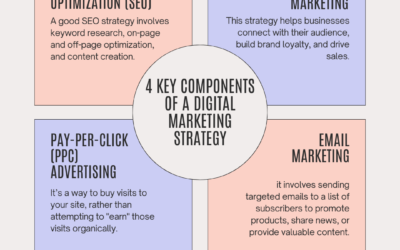Search Engine Optimization, commonly known as SEO, is a method used to make websites more visible on search engines like Google. When people search for something online, search engines show them a list of websites that match their query. SEO helps your website appear higher up on that list, which means more people are likely to visit it. To achieve this, SEO involves tweaking various elements of your website, such as its design, the words used in your content, and how quickly the site loads. By making these adjustments, your website becomes more appealing to search engines, which in turn helps it rank better in search results. This process is crucial for businesses and individuals who want to increase their online presence and attract more visitors to their sites.
Why is SEO important?
- Increased Visibility: SEO helps your website rank higher in search engine results pages (SERPs), making it more visible to potential visitors. This increased visibility can lead to more traffic to your website as more people find and click on your link.
- Credibility and Trust: Websites that appear at the top of search results are often perceived as more credible and trustworthy. Users tend to trust search engines to provide the best and most relevant results first, so a higher ranking can enhance your site’s reputation.
- Cost-Effective: Compared to paid advertising, SEO is a cost-effective strategy for attracting organic traffic. While paid ads can be expensive, SEO focuses on improving your site’s natural ranking, which can lead to sustained, long-term traffic without ongoing costs.
- User Experience: Good SEO practices enhance the usability and user experience of your website. By making your site easier to navigate, faster to load, and more mobile-friendly, you not only help search engines index your content better but also create a better experience for your visitors.

Read More : Backlink Building and On-Page Optimization for Long-Term Organic Growth
How Search Engines Work
- Crawling: Search engines like Google use special programs called bots, crawlers, or spiders to explore the internet. These bots visit websites and look at all the content on each page, including text, images, and links. Think of them as digital scouts that gather information about new and updated web pages.
- Indexing: Once the bots find and collect the content, they bring it back to the search engine, which then stores all this information in a giant database called an index. This index is like a huge library where every web page is cataloged, making it easy for the search engine to quickly find and retrieve the right pages when someone searches for something.
- Ranking: When you type a query into a search engine, it doesn’t just show any random pages. Instead, it uses complex formulas known as algorithms to decide which pages should appear at the top of the search results. These algorithms consider many factors such as how relevant the page is to your search, the quality of the content, how fast the page loads, and whether the site works well on mobile devices. The goal is to show you the most useful and relevant results first.
How to optimize websites for search engine ?
To improve your website’s visibility on search engines, you need to focus on three main areas: On-Page SEO, Off-Page SEO, and Technical SEO. On-Page SEO involves using the right keywords that your audience is searching for, creating high-quality content that meets their needs, and optimizing HTML elements like title tags, meta descriptions, headers, and image alt text. Off-Page SEO is about building your website’s reputation by earning backlinks from other respected websites, engaging with your audience on social media, and getting your brand mentioned on other sites, even if they don’t link back to you. Technical SEO ensures your site performs well and is easy for search engines to crawl. This includes making sure your site loads quickly, is mobile-friendly, uses HTTPS for security, and has a proper sitemap and robots.txt file to guide search engines on what to index.
Pointers:
- On-Page SEO:
- Keywords: Use relevant keywords your audience searches for.
- Content: Create valuable, high-quality content that meets user needs.
- HTML Elements: Optimize title tags, meta descriptions, headers, and image alt text.
- Off-Page SEO:
- Backlinks: Get links from reputable websites.
- Social Signals: Engage with users on social media platforms.
- Brand Mentions: Get your brand mentioned on other websites, even without links.
- Technical SEO:
- Site Speed: Ensure your site loads quickly.
- Mobile-Friendliness: Optimize your site for mobile devices.
- Secure Website (HTTPS): Use SSL certificates for site security.
- Sitemap and Robots.txt: Create a sitemap and use robots.txt to guide search engines.
Tools for SEO
SEO, or Search Engine Optimization, is essential for boosting a website’s visibility and attracting more visitors. To effectively optimize a website, several tools are available that aid in different aspects of the process.
- Google Analytics: This tool helps track and analyze website traffic, providing insights into where visitors are coming from, which pages they visit most, and how they interact with the site. By understanding user behavior, website owners can make informed decisions to improve their site’s performance.
- Google Search Console: This tool allows website owners to monitor their site’s presence in Google search results. It provides valuable data on how the site is indexed, identifies any issues that may affect search visibility, and offers suggestions for optimization.
- Keyword Research Tools: Keywords are the foundation of SEO, as they determine what terms users are searching for. Tools like Ahrefs, SEMrush, and Google Keyword Planner help identify relevant keywords for a website’s content, enabling site owners to target the right audience and improve their search rankings.
- SEO Auditing Tools: Regular audits are crucial for identifying technical issues, optimizing content, and improving overall SEO performance. Tools like SEMrush and Ubersuggest analyze websites to uncover areas for improvement, such as broken links, duplicate content, or missing meta tags.
By utilizing these SEO tools effectively, website owners can enhance their online presence, attract more organic traffic, and ultimately achieve their business goals. Whether it’s analyzing traffic patterns, monitoring search visibility, conducting keyword research, or auditing site performance, these tools provide invaluable support in optimizing websites for search engines.

Best practices for SEO
- Content is Key:
- Keep your website updated with new and good-quality content.
- Make sure your content is unique and actually helps people.
- User-Friendly Design:
- Make it simple for people to move around your website.
- Speed up your site and make sure it works well on mobile phones.
- Building Links:
- Aim for getting good links from trustworthy websites.
- Don’t try shady tricks like paying for links.
Additional Points
- Regular Updates: Update your website often to keep it fresh and interesting.
- Originality: Create content that’s unique and valuable, not just copies of what’s already out there.
- Easy Navigation: People should be able to find what they need without getting lost or frustrated.
- Site Speed: A fast website keeps visitors happy and engaged.
- Mobile-Friendly: More and more people use phones to browse the web, so make sure your site works well on them.
- Quality Backlinks: Links from respected sites can improve your own site’s reputation and visibility.
- Avoiding Black Hat SEO: Shortcuts might seem tempting, but they can get you penalized by search engines in the long run.
Read more : 5 Effective Strategies to Increase Website Traffic
Conclusion
- SEO is Always Going: SEO, which stands for Search Engine Optimization, isn’t a one-time thing. It’s a constant effort that needs to be kept up with over time.
- Keep Creating Good Stuff: The key to SEO success is making valuable content. This means stuff that people find useful, interesting, or entertaining.
- User Experience Matters: Make sure your website is easy and enjoyable to use. If people like being on your site, search engines will notice and rank you higher.
- Rise Up the Rankings: When you do SEO right, your website will climb higher in search engine results. That means more people will see it when they search for things related to your content.
- Get Organic Traffic: Organic traffic is the best kind of traffic because it’s free and genuine. By improving your SEO, you’ll attract more people who are genuinely interested in what you have to offer.
- Stay Flexible: The internet changes fast, so your SEO strategy might need to change too. Stay open to new ideas and be ready to adapt.




